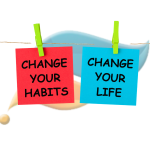A people-pleaser is an individual with an emotional need to please others at the expense of their own needs or desires.
Some common characteristics of people-pleasers are:
- Saying yes to others, even if you want to say no
- Apologizing for things you did not do
- Suppressing emotions or your own opinions
- Avoiding or fearing conflict
- Helping others when they did not ask for help
- Want everyone to like you
- Feeling guilty if you say no
- Experiencing distress if others are angry at you
- Having trouble identifying your own emotions
Where does it stem from?
Trauma:
People-pleasing can be a trauma response. It is an adaptive way of coping, and if you are a people-pleaser yourself, which may have benefited you at some point in your life. It may have kept you safe in certain relationships or situations in the past. Since it worked for you in the past, you may continue using these people-pleasing tendencies in aspects of your life to feel that you are protecting yourself, even if there is no longer any actual threat present.
People-pleasing is considered the fourth type of trauma response called fawning. The three other trauma responses are fight, flight, or freeze. Fawning is a defensive strategy that creates safety by acting how you imagine others would like you to behave to avoid conflict.
People-pleasing traits are common among people who grew up in an abusive household or a household where addiction was present. Children in this environment often have to learn to hide their needs and emotions to appease their caregivers and protect themselves from abuse. These children also usually take on a parentified child role by caring for their siblings or parents, again placing the needs of others before their own. They learn that they can only be emotionally stable when those around them are emotionally stable, so their job ensures that everyone around them is appeased. Over time, these individuals become so used to attending to the needs of others that they may have trouble even recognizing that they have needs of their own.
Low Self-Esteem:
When people feel they are not enough, they will often put their all into pleasing others to improve their self-worth. Their self-esteem correlates to the opinion’s others have about them. If others like them, then they can like themselves too. However, if others do not like them, it is often challenging for people-pleasers to handle. Rather than recognizing that their personality is not always going to jive with everyone’s, they may construe this as there being something wrong with them. Their self-worth reflects their actions and what they do for others, rather than who they are as a person. They then might attempt to change themselves into what they assume the other person would want them to be. It is easy to see how people-pleasers might lose themselves in this attempt to get everyone else to like them.
Fear of Rejection or Abandonment:
People-pleasers learn to revolve their life around the needs of others rather than their own. They may feel that if they do not act precisely how others want them to, they will be rejected or lose the love or approval of others. People-pleasers need to be needed, and part of this is because if others need them, then they know that others will not leave them.
Fear of losing control:
People-pleasing often stems from the desire to maintain control over a situation. They tend to feel personally responsible for the emotions and reactions of others and make it their mission to improve things. They feel better about themselves if they succeed. If they cannot do this, they feel dysregulated and out of control.
The impact of people-pleasing:
A people-pleaser does not mean anything is wrong with you. It was most likely an adaptive coping response you developed to protect yourself at some point. Many strengths are associated with being a people-pleaser, including being hardworking, good at reading others, helpful, kind, and empathic. However, if you are a people-pleaser, it’s important to examine your behaviors to determine if it’s negatively impacting your life. The following is a list of negative impacts that people-pleasing can have:
- You may notice yourself feeling angry or annoyed at others. You might think that others are taking advantage of you and might start to feel sorry for yourself because you feel a sense of obligation to help others.
- Stress and anxiety as a result of overcommitting yourself to the needs of others and neglecting your own needs.
- You might start to feel as if you do not know who you are and that you are not being your genuine self.
- Your relationships may suffer if you are a people-pleaser because you may feel resentful that you are doing everything for everyone else.
If this resonates with you, the good news is you can take steps to balance your people-pleasing tendencies with your own needs, and the first step is recognizing that you are a people-pleaser in the first place.
How to balance prioritizing your own needs with your people-pleasing tendencies:
As mentioned, there are many strengths associated with people-pleasing, and the goal is not to completely change yourself as a person. Instead, it is about creating some balance and figuring out what will serve you well.
Recognize the expectations you hold for yourself and the expectations you have for others in relationships.
An example of an unwritten rule you set for yourself in relationships might be “I should always say yes when someone needs something from me.” An example of an expectation you might hold for others in relationships might include “other people should treat me well because I try so hard to please them.”
Thinking about the unwritten rules you have for yourself and others in relationships can help you to see why you behave the way you do. However, you might notice that having these expectations in relationships does not mean people always act the way you want them to. These expectations are related to the fear of not being in control that goes hand in hand with people-pleasing- as people-pleasers believe that they can control the behavior of others through their behaviors and actions. Recognizing the expectations you hold and letting go of or reframing the ones not serving you well can be important in changing people-pleasing tendencies.
STOP
When asked to help them with a task, something inside of you immediately screams “NO,”- but you say yes anyway- this is a clear sign that you are pleasing people. People-pleasers are quick to act, quick to say yes, quick to help, and quick to apologize. When you need to act fast, realize that you may be people-pleasing and take a few seconds to stop and think before responding to the situation.
Recognize that you do not owe anyone an answer immediately, and you have the right to think about whether you can take on another task. If you don’t feel comfortable saying no right away, or you genuinely want to consider helping the person- using the line “let me get back to you” is a great option.
Set boundaries
Consider the line “you cannot pour from an empty glass.” If you don’t watch out for your own needs, there is no way you can effectively be there for the people you genuinely care about. Sometimes it is hard for people-pleasers to recognize that they have needs; however, your needs are there and are just as important as anyone else’s. Other people are not responsible for fulfilling your needs or recognizing if you are overburdened. People are not going to set your boundaries for you; if you offer something that they want or that will make their life easier – they will most likely take you up on that offer. That’s just human nature. But, if you are direct with others about what you can do, they will most likely respect that. If they don’t- it’s worth considering if they are someone you want to be around in the first place.
It isn’t easy to balance your needs with the people-pleasing way of thinking and behaving, but it is possible. Going to therapy is a great first step to practicing putting yourself first. Therapy can help you look at where the people-pleasing behavior stems from and how it manifests in your life, help correct cognitive distortions connected to your people-pleasing behaviors, and support you in taking steps toward putting yourself first.



